Takeaway for writers
True? True—in your writing if not in your life. You may recall that last month I wrote about the types of toxic mother/daughter relationships, and how the patterns could hold regardless of who the two people are. You’ll find that this blog is related.
Lillian Glass profiled 30 types of toxic terrors, and just the labels are thought-provoking: cut-you-downer, chatterbox, self-destroyer, runner, silent but deadly volcano, gossip angry pugilist, gloom and doom victim, smiling two-faced backstabber, wishy-washy wimp, opportunistic user; bitchy, bossy bully; jokester, unconscious social klutz, mental case, bullshitting liar, meddler, penny-pinching miser, fanatic; me, myself, and I narcissist; Eddie Haskell, self-righteous priss, snooty snob, competitor, control freak, accusing critic, arrogant know-it-all, emotional refrigerator, skeptical paranoid, instigator.
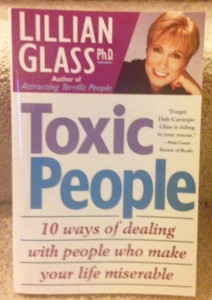
Translating this into writing: the presence of a toxic character immediately raises tension and conflict. That is their role, to make other people’s lives miserable. But spread the glory: don’t make one character carry the entire burden of toxicity. Consider a couple, apparently happy together but each toxic to other people in different ways.
Glass’s book is basically a self-help book, so she also offers 10 techniques for handling toxic people: tension-blowout (deep breathing), humor, stop-the-thought, mirror (reflecting the behavior back), direct confrontation, calm questioning, give-them-hell-and-yell, give-them-love-and-kindness, vicarious-fantasy, unplug (the person from your life).
Translating this into writing: have your characters deal with the toxic person(s) in different ways, with varying degrees of success. And the inappropriate behaviors that she advises you never to do in real life (e.g., physical violence) are perfectly appropriate—and often effective—in achieving your writerly goals.
Glass offers an exercise for identifying the types of people who drive the reader nuts. As the author, you could complete this exercise for your main characters. Identifying the consistencies might even provide insights about how to make your character(s) richer and more real.
My edition of the book was published in 1997, but toxic people are timeless! This and several of her other books are available on Amazon, and I urge you to consider whether it would be helpful to you.
Writers Need Toxic Relationships
The Principle of Least Interest
Why Women Have Sex: Character Motivation Matters
Rational and Irrational Behavior in Your Characters: Guest Post on Thrill Writers
Books for Writers: Deborah Tannen
Not a national holiday, but coming the day before Veterans Day, flags are often flying for the Marines as well.
Character considerations: does your character fly a flag year-round, on holidays, or not at all? Why?
Speaking of Veterans Day, this one’s enjoyed a twisted history. The fighting of WWI—known at the time as “The Great War”—ceased when an armistice took effect between the Allied nations and Germany. It went into effect on the eleventh hour of the eleventh day of the eleventh month—the end of the war to end all wars—in 1918. In November 1919, President Wilson proclaimed November the first commemoration of Armistice Day. In 1926, the U.S. Congress officially recognized November 11, 1918, as the end of WWI and urged people to observe the day in schools and churches, or other suitable places, with appropriate ceremonies. In 1938, it became a legal holiday—dedicated to the cause of world peace.
Character considerations: is your character patriotic? By whose definition? How would your character have responded to the renaming of the day, the changing dates, and the changing nature of the celebrations?

Janet Burroway once said, “In literature, only trouble is interesting.” Trouble is the source of tension, conflict, struggle, etc. And what better source of trouble than characters caught in toxic relationships.
 The Psychology Today website published a blog by Peg Streep titled, “8 Types of Toxic Patterns in Mother-Daughter Relationships.” (Yes, I know that scholars consider Psych Today to be pretty light-weight. I’m a card-carrying psychologist myself. But I like Psych Today. It isn’t intended to be a scholarly journal. It is a magazine for the public, and often prints what’s trending. And if a writer creates great fiction on a faulty premise, who cares?) But back to the main point. Streep labeled eight types of unattuned and unloving mothers:
The Psychology Today website published a blog by Peg Streep titled, “8 Types of Toxic Patterns in Mother-Daughter Relationships.” (Yes, I know that scholars consider Psych Today to be pretty light-weight. I’m a card-carrying psychologist myself. But I like Psych Today. It isn’t intended to be a scholarly journal. It is a magazine for the public, and often prints what’s trending. And if a writer creates great fiction on a faulty premise, who cares?) But back to the main point. Streep labeled eight types of unattuned and unloving mothers:
The labels are pretty indicative of the toxicity described. Read the actual blog. The good news for writers is that these toxic relationships needn’t be limited to toxic mothers and vulnerable daughters. (You may recognize here an echo of what I said about Deborah Tannen’s analysis of mother-daughter communication patterns: what one says isn’t necessarily what the other hears could apply to virtually any long-germ relationship.) In this instance, consider toxic relationships between husbands and wives. Consider boss and subordinate. Consider role reversal in that it’s the daughter who is toxic.
Three cheers for toxic (literary) relationships!
The Principle of Least Interest
Why Women Have Sex: Character Motivation Matters
Rational and Irrational Behavior in Your Characters: Guest Post on Thrill Writers
Books for Writers: Deborah Tannen
I’m currently at the James River Writers Conference. Here’s more about the conference.
Is This Writers Conference for Me?
Every writer wants—or should want—to create characters who are vivid, interesting, and memorable. My advice is to choose a quirky interest that will allow you to illuminate various aspects of your character’s character.
Take turtles, for example. You’ll recall from my blog posts on August 15 and August 22, I have an affinity for Eastern box turtles. I enjoy them in situ. When I discovered the male turtle I’d encountered periodically over the past few years in the middle of the cul de sac in front of my house, smooshed by a car, I went into a funk. Two days later, I found a baby turtle—about the size of a fifty-cent coin, so new its shell was still flexible—I felt both joy and concern. I picked it up from the sidewalk and released it on the bank behind my house. The next day, I saw a baby turtle smooshed in a driveway across the street. I cried. Was it “my” turtle or a clutch mate? Should I have moved it from the sidewalk to grass closer to where it might have been trying to go? More recently, I found this male turtle on the bank behind my house— younger, I think, than the one that died. Suddenly, the world looked brighter again.
Consider a fictional character with a turtle interest, then answer a few questions. Is it a house turtle or turtles in the wild? What might either answer reveal about your character? Much can be gleaned from how a person interacts with a pet. We’re more familiar with dogs and cats, maybe birds; how might interacting with a turtle be similar and different? Where did the interest in turtles come from?
Does the turtle hold some symbolic importance for your character? Turtle symbolism includes order, creation, patience, strength, stability, longevity, innocence, endurance, and protection.
Does the turtle interest originate in cultural or ethnic roots? The symbolism of turtles varies widely around the world, so do a little research depending on the ethnic heritage of your character: Africa, Egypt, ancient Mesopotamia, Greece, ancient Rome, Malaysia, China, India, Japan, Vietnam, Taiwan, North America, South America, Tahiti, Polynesia.
Or maybe it’s an interest in turtles in specific venues: folklore, literature, children’s books, films and television, even video games. If you want to get really esoteric, make it an interest in turtles on old coins, flags, or heraldry.
Much as I favor turtles, they are not the only rich way to quirk your character. My favorite all-purpose symbolism reference—animals, dates, numbers, plants, etc.—is The Penguin Dictionary of Symbols.
Sometimes a more specialized examination of symbols is appropriate.
I once wrote a short story titled “Speak to Me” in which the main character is a woman who carves grave stones and communicates with her anonymous lover through the symbols of flowers and funerary art. (This story appeared in Apalachee Review, Number 56, 2006, and is reprinted in the Different Drummer collection.)
Get beyond fiddling with hair or popping gum and choose a rich quirk for your character. If it’s a novel, you are going to be spending a lot of time together, and if you aren’t interested, neither will your reader be!
The Principle of Least Interest
Why Women Have Sex: Character Motivation Matters
Rational and Irrational Behavior in Your Characters: Guest Post on Thrill Writers
Sometimes things just come together. I’ve had a long-standing interest in graveyards and cemeteries. My all-time favorite is Mount Auburn Cemetery in Cambridge, Massachusetts. The primary picture on my website was taken there! It is the first garden cemetery in the United States, established in 1834.
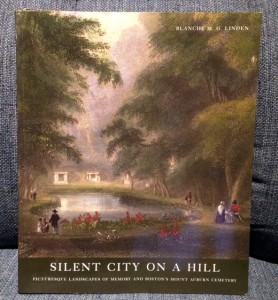
So, of course, when I moved to the area, I visited Hollywood Cemetery, the third garden cemetery in the United States.

At that time, I lived in the McMurdo house in Ashland, built in 1858. Apparently Stonewall Jackson headquartered there briefly during the battles around Richmond—briefly meaning only a few hours. But it piqued my interest in the Civil War.
After touring the White House of the Confederacy, I visited the gift shop there. After visiting historic sites or museums, I always check the gift shop for off-beat books. In this instance, I found The Story the Soldiers Wouldn’t Tell: Sex in the Civil War.
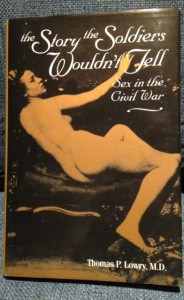
So when the call went out for stories for Virginia Is For Mysteries, it all came together. I wrote “Death Comes to Hollywood Cemetery.” My amateur detective is Clara, a good natured prostitute who plies her trade with fetishists in Richmond and the surrounding area during the Civil War.
I love it when everything comes together!
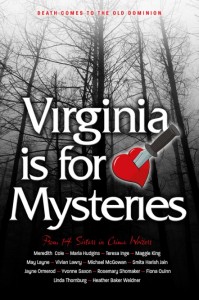
How was it chosen? What does it mean? How does it look? How do you feel about it?
My father John shared the name with a brother of his mother. My mother’s Alta Wavalene came from her father’s youngest sister and her mother’s youngest sister. There are no Vivian’s on either branch of the family tree. Were my parents consciously striking out in a different direction?
One story I heard growing up is that Vivian was the name of my father’s first girlfriend, and he liked it. So, does this reflect my father’s dominance or my mother’s confidence?
Vivian means lively, and likes bright or vivid colors. The latter definitely applies, and I like to think the former does as well. As for appearance, Vivian is all spikes and angles, especially when written in caps: VIVIAN. Hmmmm. No comment. But I do know I felt out-of-place among the Sharons and Shirleys and Barbaras. As a child, I wanted a nickname and it was never forthcoming. As an adult, I like that I have seldom come across another Vivian, and only an Italian chef ever called me Vi.
Your characters’ names are as important to them as yours is to you. Give them some thought. As with everything, there are books out there to help. My personal favorite is Character Naming Sourcebook by Sherrilyn Kenyon. For one thing, it starts with an overview of things to consider. In brief, and paraphrased, the ten guidelines are
Your character’s name is the usual introduction to the reader. Lydia is harder than Nora. Cynthia is more upscale than Bertha. Bart is stronger than most two-syllable male names.
In deciding on names, avoid not only the beginnings but the endings. Alex, Alice, Amy, and Andrew will confuse readers and turn them off. At the same time, choose nicknames and/or endearments with care. I recently critiqued a manuscript in which William was Billy to the family, Victoria was Vickie,
Margaret was Maggie, Susan was Suzie, and endearments were honey and sweetie. Not a big deal, but if the reader notices, it’s too much.
I like Character Naming because of its breadth, and because it separates names by ethnic roots and meaning. But it isn’t the only book out there. Indeed, you can go to a local telephone directory and mix first and last names.
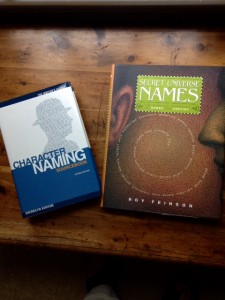
And if you are interested in the humorous side of writing, consider these:
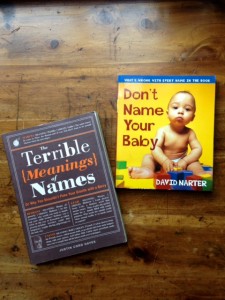
That way you won’t inadvertently name two friends Barbara Smith and Barbara Morton and end up with BS and BM!
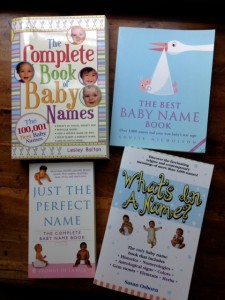

I went to see Ricki and the Flash (starring Meryl Streep) and was blown away. She was absolutely believable as an aging rock-star wannabe, estranged from her children. She’s amazing, nailing every role from Julia to Sophie’s Choice to Kramer vs. Kramer, she has bucket-loads of awards, easily found on-line. She and Helen Mirren are idols. I first noticed Mirren when she played hard-boiled detective Jane Tennison on the Prime Suspect TV series. From there to Calendar Girls to The Queen, she—like Streep—never fails to astound me. I have a good imagination. Name a topic and I can spin the outline of a story—gory, romantic, murderous, funny. . . . But there is a huge difference between being able to imagine it, or even write it, and portraying it. These and other great actors have the ability to bring widely divergent characters to life—think Dustin Hoffman in The Graduate and Tootsie. Artists in all their forms are incredible.
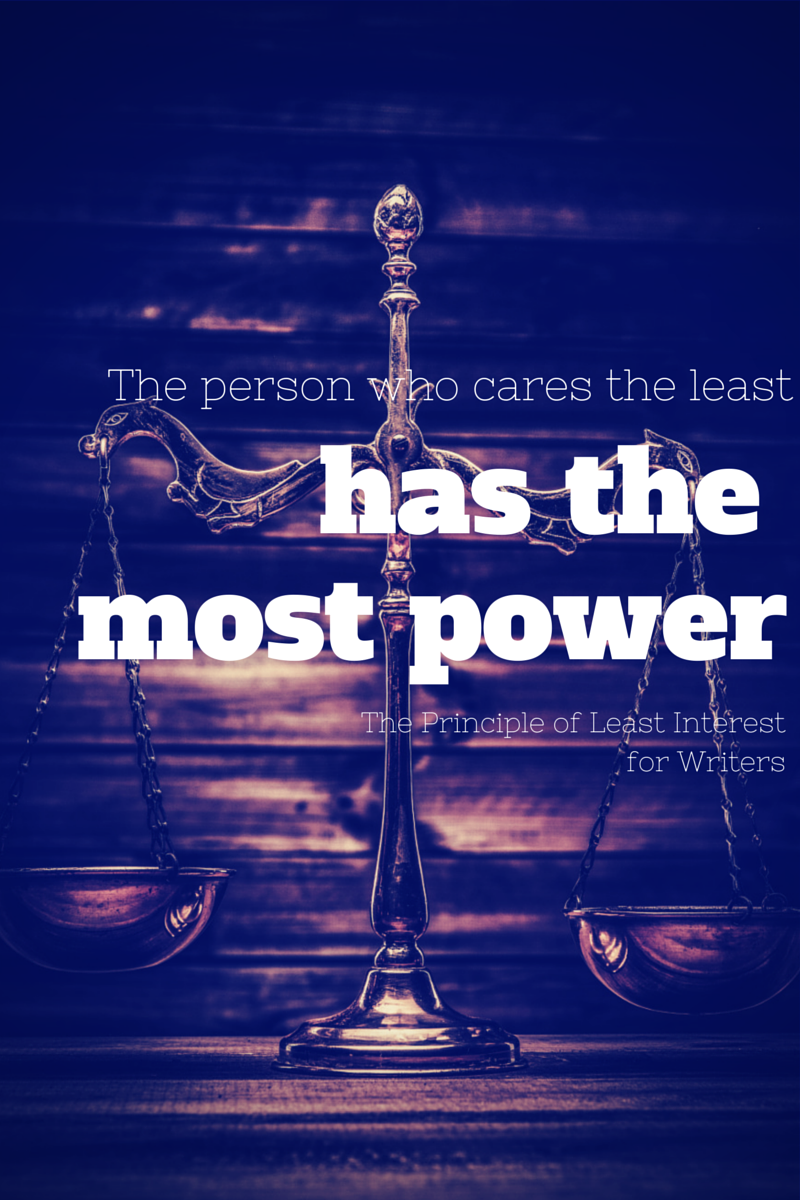
The Principle of Least Interest is one of those areas in which science has confirmed what common sense has long maintained: the person who cares the least has the most power. This principle works everywhere from the housing market to the marriage market. If the buyer is more eager to buy than the seller is to sell, the seller will determine the selling price. If he loves her more than she loves him, he could end up the proverbial hen-pecked husband of so many comedies; vice versa and she is a candidate for the downtrodden foot-wipe—perhaps abused—wife of so many tragedies. This principle is so well understood that sometimes people try to disguise their true levels of caring/interest (talk of other great offers forthcoming, flirting with or dating a rival). Inherent in disguise is the understanding that what counts is often the perception of least interest.
For your characters, know who has the power and who is perceived to have it. And if your work has more than two characters, you need to understand the power relationships for each pair.
Unlike a credit score, people can’t go on-line and check out their power ratings.The primary reason that power relationships are often unclear is that the bases of power are virtually limitless: expertise, physical attractiveness, intelligence, wealth, athletic ability, knowledge of secrets, ability to make the other’s life miserable, being popular, great sense of humor—anything and everything that is important to that pair. Knowing the facts doesn’t tell you/the reader who has the power. If she married him for the money and he married her for the Green Card, who cares more? What if we add in that she is beautiful and he’s a great problem-solver; she’s moody and he’s uncommunicative; he’s a natural athlete and she manages their money; they’re both extremely intelligent and care mightily for their two children. As the author, you can determine who has the power by giving weight to these factors based on the characters’ perceptions of what is important.
Power is seldom one-dimensional, and if you don’t recognize the complexity, your characters will be flat and unrealistic.
In many relationships—for example, boss/employee, parent/child, older sibling/younger sibling, teacher/student—the general expectation would be that the total power package would favor the former. But my guess is that most readers don’t read to confirm the norm; they like to be surprised.
You should at least consider writing against common power expectations.
And just to end on a high-brow note: according to Lord Acton, “Power corrupts. And absolute power corrupts absolutely.” Consider how less-than-absolute power might corrupt your character(s).
“Who Has the Upper Hand? Power, Sex, and Seinfeld” by Dr. Benjamin Le
The Personal Use of Social Psychology by Michael J. Lovaglia (2007)
Social Psychology and Human Sexuality: Essential Readings by Roy F. Baumeister (2001)